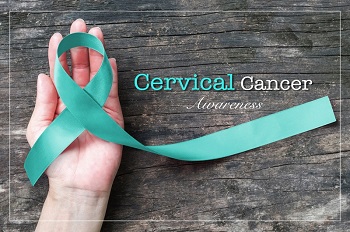
Cervical cancer is a type of cancer that occurs in the cells of the cervix.
According to World Health Organisation (WHO), Cervical cancer is the fourth most common cancer among women globally, with an estimated 604 000 new cases and 342 000 deaths in 2020. About 90% of the new cases and deaths worldwide in 2020 occurred in low- and middle-income countries.
Cervical cancer begins when healthy cells at the junction of the cervix and vagina, known as the transition zone, develop mutations. Mutations alter the normal cell cycle of cells and cause them to grow and grow out of control. Over time, an out-of-control mutated cell replicates itself and so a cluster of these mutated cells is formed.
Cause :
A large majority of cervical cancer (more than 95%) is due to the human papillomavirus (HPV). Two HPV types (16 and 18) are responsible for nearly 50% of high grade cervical pre-cancers.
Cervical cancer often presents no symptoms in its early stages, which is why it is often referred to as a “silent killer.” But as the disease progresses, warning signs may present themselves.
Some early signs of cervical cancer :
- Pressure around the lower body or frequent urination
- Gas, indigestion, constipation. Stomach fullness after light meal, stomach discomfort, etc. Abdominal problems in excess can be a sign of uterine cancer.
- Seeing many changes in the stomach from other times.
- Excessive abdominal pain or bloating.
- Nausea or repeated vomiting.
- Loss of appetite.
- Excessive weight gain or excessive weight loss.
- Feeling excessively tired.
- Bleeding after menopause in women.
- If women with cancer are not treated early, their survival rate drops by 50 percent. Those treated early have a 95 percent chance of survival.
- These are some cervical cancer risk factors :
- Many sexual partners: The more sexual partners you have — and the more sexual partners your partner has — the more likely you are to contract HPV.
- Sexual activity in childhood: Having intercourse at a young age raises your risk of HPV.
- A weakened immune system: If your immune system is weakened due to another health condition and you have HPV, you may be more likely to develop cervical cancer.
- Smoking :Tobacco use is linked to cervical cancer.
Prevention :
Human Papillomavirus (HPV) Vaccine:
The HPV vaccine protects against the types of HPV that most often cause cervical, vaginal, and vulvar cancers.
HPV vaccination is recommended for preteens aged 11 to 12 years, but can be given starting at age 9. HPV vaccine also is recommended for everyone through age 26 years, if they are not vaccinated already .HPV vaccination is not recommended for everyone older than age 26 years.
Two screening tests can help detect changes that may progress to precancer or cervical cancer—
1.The Pap test (or Pap smear): It looks for precancers, which are cell changes on the cervix that can progress to cervical cancer if not treated properly.
2.The HPV test : It looks for the virus that can cause these cell changes (human papillomavirus).
People can also take the following steps to help prevent cervical cancer:
- Delaying first sexual encounter until late adolescence or older.
- Putting a limit on the number of sexual partners.
- Using condoms and dental dams to practice safer sex.
- Avoiding sexual encounters with people who have had multiple partners.
- Avoiding sexual contact with people who have genital warts or show other symptoms.
There are many cancer patients who are apathetic about treatment. In this regard, building awareness is most important. It can be seen, in most cases, they are suffering from cancer for a long time or in advanced stage with various complex symptoms. Currently, the world has an advanced cancer treatment system. Therefore, as soon as the symptoms appear, treatment should be done as per the advice of an experienced doctor.


